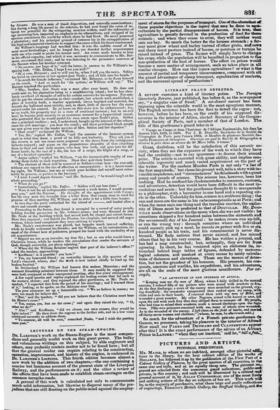LECTURES 0/f THE STEAM-ENGINE.
DR. LARDNER'S work on the Steam-Engine is the most compen- dious and generally useful work on this great power. The bulky and voluminous writings on this subject, by able engineers and others, may probably contain matter not to be found here ; but all that the general reader can require relating to the construction, operation, improvement, and history of the engine, is embraced in 1)r. L./Llama's Lectures, This fourth edition becomes almost a new work by the addition of two chapters,--the one containing a concise but luminous account of the present state of the Liverpool Railway, and the performances on it ; and the other a review of the efforts that have been made to establish steam-carriages onthe common turnpike-roads. A perusal of this work is calculated not only to communicate much solid information, but likewise to disperse many of the pre- judices that are still floating on the public mind against the employ- meet of steamier the purposes-of troassport. Onesttheabsurdest at.
these popular objections is the, infany that way be done to . culturists by the partial disappearance of horses. It is true; agriculture is greatly devoted to the production of food 'fin. these • animals ; and when they cease to' exist, they will neither want oats nor hay. So much the better for the human stomach: a far. mer must grow wheat and barley instead of other grain, aniteowit and sheep must pasture instead of horses, or potatoes or turnips be raised instead of grass. The farmer will simply have to change his crops, while the population will be benefited in proportion to the non-production of the food of horses. The effect on prices woul& become a mere matter of arrangement, such as takes place in all similar changes. How can this injure agriculture? or what is the amount of partial and temporary inconvenience, compared with all. the grand advantages of cheap transport, equalization of markets, and the universal spread Of productions ?


























 Previous page
Previous page